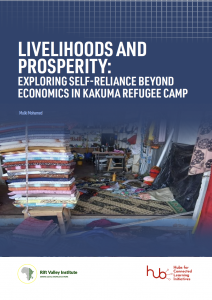This paper explores how agency and livelihoods are articulated and shaped in the overall picture of refugee life as a whole, specifically in Kakuma refugee camp in north-western Kenya. It digs into the details of how refugees exercise self-reliance, resilience and identity, questioning conceptualizations of livelihoods framed purely in economic terms. It explores livelihoods as phenomena pursued by means of diverse economic, social and cultural activities, shaping identities and mindsets just as much as they shape financial success. The author draws on interviews and focus group discussions to examine the various factors influencing livelihood choices and goals. The author uses qualitative approaches to critically interact with key concepts that shape understandings of refugee agency and resilience. Overall, the paper argues that agency in refugee circumstances goes beyond financial activity, comprising complicated choices based on personal beliefs and social networks. It emphasizes that a richer understanding of self reliance in refugee contexts involves considerations of dignity, resilience and resourcefulness. Articulating wider discussions about civic engagement, the paper explores refugees as active citizens, eager to shape their own lives not only for the sake of achieving financial independence but also to prosper on multiple other non-financial fronts.
This paper has been published as a result of Mulki’s training with the Rift Valley Institute’s (RVI) Research Communities of Practice (RCoP) project, a partnership carried out with funding from the Open Society University Network Hubs for Connected Learning Initiatives. It therefore reflects the views of the author and not the views or position of the Rift Valley Institute. RCoP is among several RVI flagship projects that support the professional development of early career researchers in eastern and central Africa through training, mentorship and the dissemination of research outputs. It is a values-driven project based on RVI’s long-term experience and presence in the region, built around a community of practitioners and academics with a common interest in the professional development of early career researchers. In the third phase of the project, RVI trained seven early career researchers from Kakuma refugee camp between May and October 2024.




